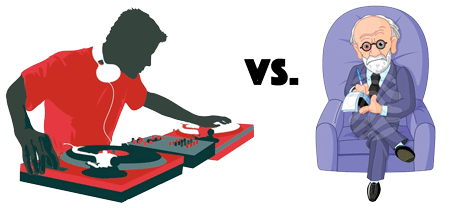Recently, as I looked out from behind my DJ mixer and saw a crowd of 300 sweaty, happy dancers and a funny thought came to me – “this is like some of my experiences as a psychotherapist!”
as I looked out from behind my DJ mixer and saw a crowd of 300 sweaty, happy dancers and a funny thought came to me – “this is like some of my experiences as a psychotherapist!”
Some people know that in addition to being a psychotherapist I’m a DJ – I play music through big sound systems to make people dance. I started as a radio DJ when I was in college and now I have more than twenty years of experience. Over those years I’ve DJ’d all sorts of events: bars, underground raves, clubs, festivals, weddings, corporate events, fundraisers and much more. Many of the skills I’ve learned as a DJ have parallels in my therapy practice. And vice versa. Let me give you some examples of what I mean.
As any good DJ knows, the ability to read the crowd and tell what is working and what isn’t working is a key skill. One wrong move and the dance floor excitement can fade and people start walking away. Similarly, the ability to pay attention to what my therapy clients are experiencing is vital. By tracking subtle changes in expression, body posture and mood I help connect them with the reality of their experience, and we learn more about how they organize their thoughts and beliefs. Ultimately, it’s about sensitivity. Am I paying close attention? Am I bringing my full presence? This helps me be a better DJ and a better therapist.
Another example: as a DJ sometimes I need to play a crowd-pleaser; a song that is easy to dance to that people know. But sometimes I need to challenge them and introduce them to sounds that might be unfamiliar. As a psychotherapist I do something quite similar. There are times when I need to provide a very safe, known experience. But then there are other times – after we’ve gotten to know each other and have established a trusting relationship – when I challenge my clients, and ask them to step out of their comfort zones.
Finally, as a DJ I have learned a lot by being a dancer and listening to other DJs. I observe changes and choices that other DJs make, and notice how they affect me as a dancer. The parallel here is clear. I have been in therapy myself, and discovered what it’s like when the tables are turned. I know the difficulty of searching out guidance and reflection in times of crises and change. I have experienced building a trusting relationship with my therapist. And that informs how I sit with my therapy clients.
So far I’ve shared how being a DJ has informed me as a therapist. But it flows the other way too. As a therapist, I have had to deepen my emotional vocabulary, and I’ve gotten more comfortable with the realities of sadness, loneliness and pain. And I think that is reflected in some of my sets as a DJ when I chart a course through more evocative music. Yes, being happy and feeling good is important. But we contain other feelings as well: anger, sadness, and fear. Dance can access so many places inside us that hold difficult feelings. And a skilled DJ – or therapist – can guide one through those places.
Of course, there’s lots of obvious ways in which being a therapist and a DJ are NOT similar. But being a therapist and DJing have more in common than one might perceive at first glance. If you are interested in learning more about me as psychotherapist I offer a free 30-minute in person or phone consultation. If you like, we can even discuss your love of that incredible song you just can’t stop dancing to.
Yours In Service (and Bass),
Alexander Warnow
XY Counseling specializes in working with men, couples and teens. Alexander Warnow, Licensed MFT # 92437, started XY Counseling because he saw a need for men to be supported by other men.
